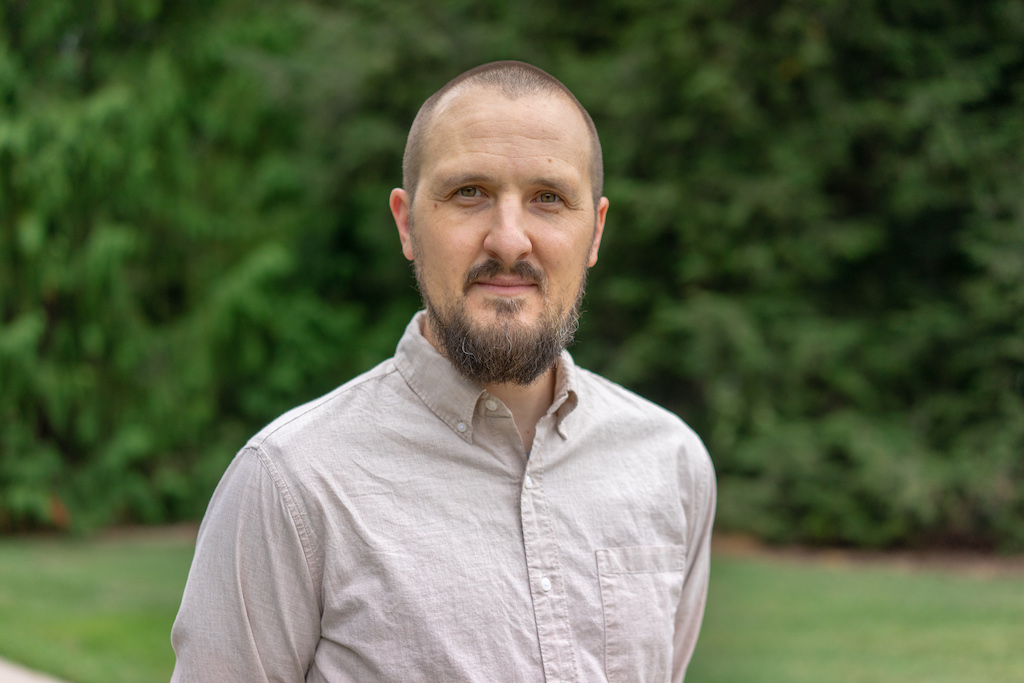
The latest episode of the Liberal Arts Endeavor Podcast, titled Design and the Parameters of Possibility, is out. Our host, Dean Christopher P. Long, spoke with Zachary Kaiser, Assistant Professor of Graphic Design and Experience Architecture, about how design has the potential to shape the world that we live, work, teach, and even eat in.
Kaiser’s research interests include exploring how faculty from universities are evaluated. According to Kasier, much of this work was inspired by Dean Long.
“I never imagined that I would conduct work like this,” said Kaiser. “It’s cool to know that Dean Long is thinking about the same kind of things and he’s been a partner in this with me.”
Similar in a way to how students are graded, faculty are rated on numbered scales and with other metrics. He has produced a series of pieces that are inspired by his research in faculty metrics. They include a “real-time” assessment of a faculty member’s metrics as a stock ticker and a piece of software called CitationBomb.
If everybody is not okay with the way things are right now…then we need to redefine what scholarship means to us.
“I want to address this issue in academia. [My work] is just a sketch of what a different future could be like,” said Kaiser. “If everybody is not okay with the way things are right now, then we should talk about a different way of evaluating each other and our work. If we don’t like it, then we need to redefine what scholarship means to us.”
Kaiser continues to question metrics in academia, even as it pertains to the courses that he teaches within the Graphic Design and Experience Architecture (XA) programs. He asks students to consider how they fit into the industry that they are about to work in.
“We need to think of our values as an educators or colleagues to open up spaces where people are able to do things that they are actually interested in, not just doing things to make their stats go up,” said Kaiser.
Kaiser considers the XA program a meeting point between society and technology and urges his students to question the future of that relationship.

“The way we think of ourselves as computing machines, and the way we also accept that is inevitable. Is that what the students want? Do you want the future that you’ve been told is going to happen?” said Kaiser.
These questions led Kaiser to an article that will be published this summer in Design and Culture, a journal that examines contemporary design. His article examines what it means to teach design in what he calls the “age of automation,” where computing systems can complete similar tasks as designers.
Though Kaiser is still interested in studying the way that academia is shaped by computing, his most recent endeavor relates to how technology impacts agriculture and food. He spent some time last summer in Malawi with Dr. Stephanie White from the College of Natural Resources, who studies urban agriculture. In Malawi, the two hosted workshops among stakeholders within urban food systems.
We need to think of our values as an educators or colleagues to open up spaces where people are able to do things that they are actually interested in, not just doing things to make their stats go up.
“We are hoping to facilitate a conversation between stakeholders who usually don’t communicate with one another, like people who work in urban farmers markets, producers, and the city itself, to talk about the future of food system,” said Kaiser. “How do they want it to evolve? What do they hope it looks like?”
Kaiser hopes to study the relationship between agriculture technology and the imagination of the future with those technologies. He wants to engage with what he calls the “technological imaginary” of the development world. This includes how the future of technology impacts food systems.
To learn more about Kaiser’s research and academic work, listen to the Liberal Arts Endeavor, visit his website, and keep up with him on Twitter.


